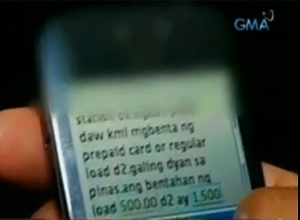The Department of Information and Communications Technology (DICT) is considering to decommission 2G wireless communication to address the proliferation of text or short messaging service (SMS) scams.
At the sidelines of a news forum in Quezon City on Saturday, DICT Undersecretary for Cybersecurity Jeffrey Ian Dy said scam hubs are using International Mobile Subscriber Identity (IMSI)-catchers “to extract your calls and your texts and to be able to blast.”
IMSI-catchers, also called rogue cell towers or cell site simulators, are used to intercept text messages and eavesdrop on phone calls which can be also used for text blasts in scamming operations by posing as telcos, banks, or job recruiters.
Dy said IMSI-catchers “only works with a technology that’s below 3G… It works on 2G [technologies like] EDGE, GPRS.”
“So we’re already talking to telecommunications providers, this has to be through the regulator —the National Telecommunications Commission (NTC)… We should now have a timeline to deprecate or to retire these equipment,” the DICT official said.
Dy said the DICT, NTC, and mobile service providers should seriously begin considering the phase out of 2G mobile technology.
“We need to start the discussion on retiring anything that is below 3G in cellular mobile telecommunications perhaps in the next two years,” he said.
“I understand that there are cost implications to this particular request,” he added, noting that the move could increase the cost of phone calls and text services.
A total of 6,157,517 text short message service (SMS) scams were reported in the Philippines in 2024, according to caller identification service provider Whoscall.
Dy said retiring or decommissioning 2G technology could help in lessening text scams.
“For security purposes, we have to follow what our neighbors are now discussing… If we act now, it will significantly be lesser,” he said. — VDV, GMA Integrated News
DICT mulls retiring 2G mobile services to deter text scams – GMA News Online

